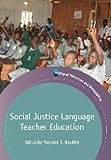Social Justice Language Teacher Education / ed. by Margaret R. Hawkins.
Material type: TextSeries: Bilingual Education & BilingualismPublisher: Bristol ; Blue Ridge Summit : Multilingual Matters, [2011]Copyright date: ©2011Description: 1 online resource (200 p.)Content type:
TextSeries: Bilingual Education & BilingualismPublisher: Bristol ; Blue Ridge Summit : Multilingual Matters, [2011]Copyright date: ©2011Description: 1 online resource (200 p.)Content type: - 9781847694232
- 9781847694249
- 418/.0071 22
- P53.8 .S624 2011eb
- online - DeGruyter
| Item type | Current library | Call number | URL | Status | Notes | Barcode | |
|---|---|---|---|---|---|---|---|
 eBook
eBook
|
Biblioteca "Angelicum" Pont. Univ. S.Tommaso d'Aquino Nuvola online | online - DeGruyter (Browse shelf(Opens below)) | Online access | Not for loan (Accesso limitato) | Accesso per gli utenti autorizzati / Access for authorized users | (dgr)9781847694249 |
Frontmatter -- Contents -- Contributors -- Introduction -- Chapter 1. Teacher Education for Social Justice -- Chapter 2. Multimodality, Social Justice and Becoming a ‘Really South African’ Democracy: Case Studies from Language Classrooms -- Chapter 3. Does Intercultural Bilingual Education Open Spaces for Inclusion at Higher Education? -- Chapter 4. Education and Social Justice in Neoliberal Times: Historical and Pedagogical Perspectives from Two Postcolonial Contexts -- Chapter 5. Enfranchising the Teacher of English through Action Research: Perspectives on English Language Teacher Education in Uganda -- Chapter 6. Dialogic Determination: Constructing a Social Justice Discourse in Language Teacher Education -- Chapter 7. Creating a School Program to Cater to Learner Diversity: A Dialogue between a School Administrator and an Academic -- Chapter 8. Working for Social Justice in a Collaborative Action Research Group
restricted access online access with authorization star
http://purl.org/coar/access_right/c_16ec
Social justice language teacher education is a response to the acknowledgement that there are social/societal inequities that shape access to learning and educational achievement. In social justice language teacher education, social justice is the driving force and primary organizational device for the teacher education agenda. What does “social justice” mean in diverse global locations? What role does English play in promoting or denying equity? How can teachers come to see themselves as advocates for equal educational access and opportunity? This volume begins by articulating a view of social justice teacher education, followed by language teacher educators from 7 countries offering theorized accounts of their situated practices. Authors discuss powerful components of practice, and the challenges and tensions of doing this work within situated societal and institutional power structures.
Mode of access: Internet via World Wide Web.
In English.
Description based on online resource; title from PDF title page (publisher's Web site, viewed 01. Dez 2022)


